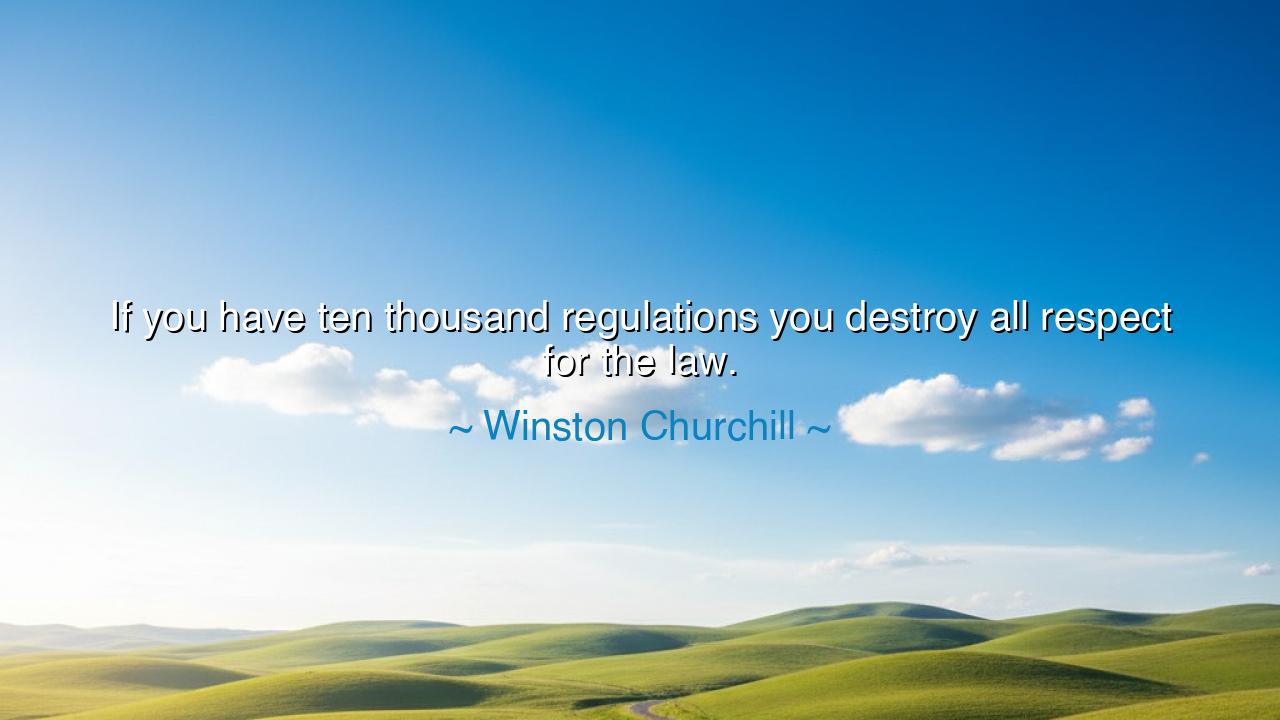
If you have ten thousand regulations you destroy all respect for






Winston Churchill, warrior of words and defender of nations, once declared with the fire of reason: “If you have ten thousand regulations you destroy all respect for the law.” In this utterance lies a truth both ancient and enduring: that law, which should be a beacon of justice, becomes instead a burden when multiplied beyond necessity. For the more rules men are forced to obey, the less they honor the spirit behind them, until the law itself is seen not as a guide to justice but as a net that ensnares.
The law is meant to protect, to bring order, to honor the dignity of all. Yet when it is choked by countless regulations, it loses its nobility. Laws too many confuse rather than clarify, bind rather than liberate, and weary the people until they no longer respect the justice they were meant to uphold. The ancients spoke of this: Cicero warned that “the more laws, the less justice.” For respect cannot be commanded by confusion; it must be earned by fairness and simplicity.
Churchill, who guided Britain through the tempest of war, understood this deeply. In moments of peril, clarity is power. When the law becomes tangled in endless decrees, people lose faith. They no longer see law as the guardian of their rights, but as the weapon of their rulers. Thus, he reminds us that the true strength of law lies not in its quantity, but in its quality—in a few clear, just principles that stand like mountains rather than in a forest of rules that crumble like reeds.
History shows us this principle in vivid color. Consider the fall of the late Roman Empire. In its decline, the empire was burdened with endless edicts, taxes, and bureaucratic decrees. What began as an empire of law, admired for its clarity, became a labyrinth of regulations that no citizen could follow. The people lost respect for their rulers, corruption grew, and the empire’s foundations cracked. Here we see Churchill’s wisdom proven: too many regulations do not strengthen a nation, but hollow it out from within.
The meaning is not that law should be absent, but that law must be measured and wise. Just as medicine, in the right dose, heals, but in excess, poisons, so too does law. A society thrives when its laws are few, clear, and just—commanding respect not by force, but by the reasonableness of their truth. A society falters when it seeks to control every breath of its people, for then the people cease to revere the law and instead seek to escape it.
O children of tomorrow, take heed: in your own lives, practice the discipline of simplicity. Do not bury others under endless rules or demands, for you will breed resentment, not respect. In your homes, in your communities, in your work, seek principles rather than excess. Honor fairness, clarity, and justice, and you will gain the trust of those around you. But burden them with endless commands, and they will rebel in spirit, even if they obey in action.
The lesson is plain: respect is born of clarity, not of excess. Law is strongest when it is simple, just, and rooted in eternal truths. This is true not only for nations but for individuals. If you wish others to honor your guidance, speak with wisdom and restraint. Let your rules be few, but let them be noble. For in the end, it is not the multitude of commands that secures loyalty, but the righteousness of a few.
Thus let Churchill’s words be remembered: “If you have ten thousand regulations you destroy all respect for the law.” Let them guide leaders and people alike to cherish the simplicity of justice, to guard against the corruption of excess, and to build societies where law is not a burden, but a light—respected, honored, and upheld by all.






AAdministratorAdministrator
Welcome, honored guests. Please leave a comment, we will respond soon